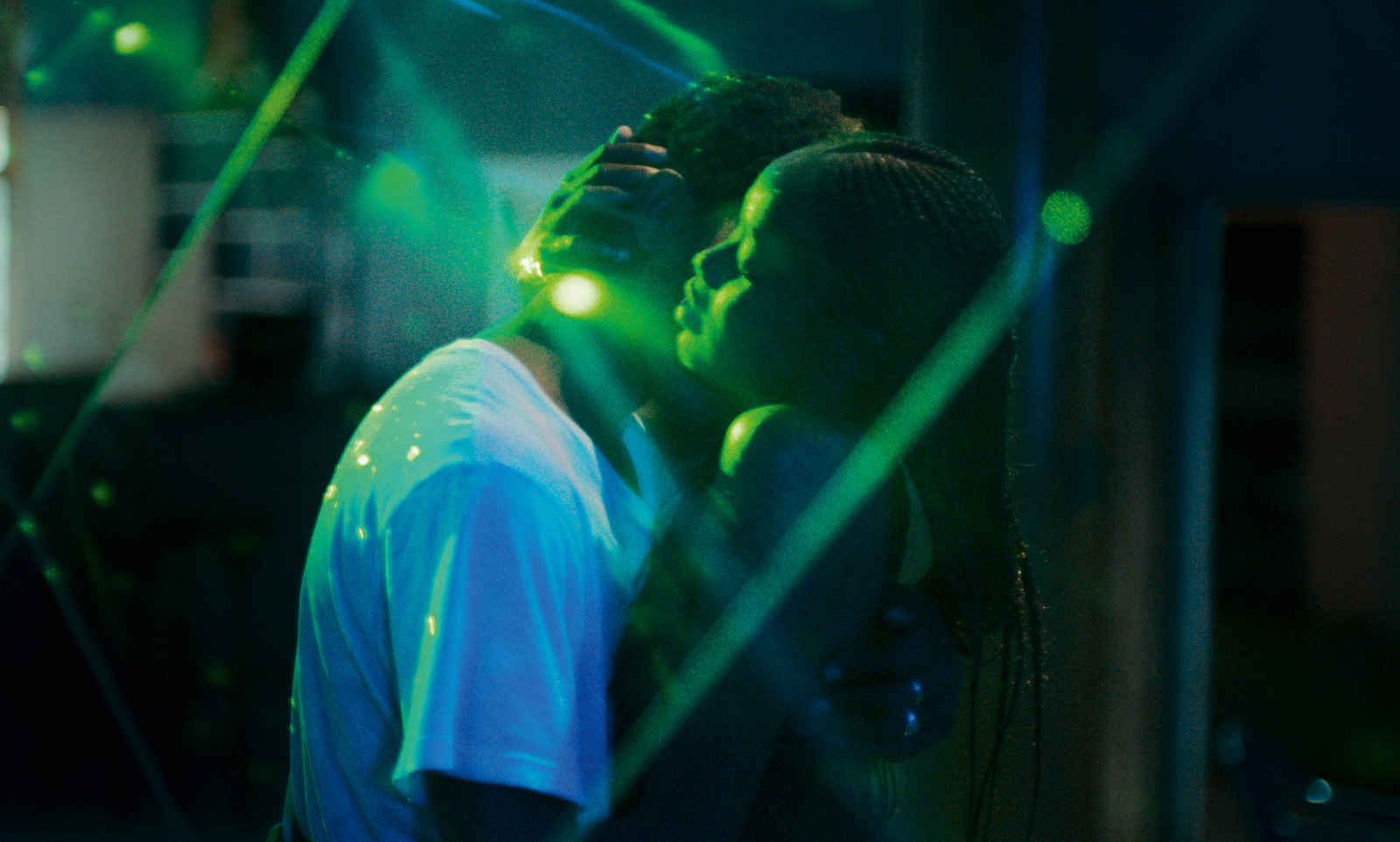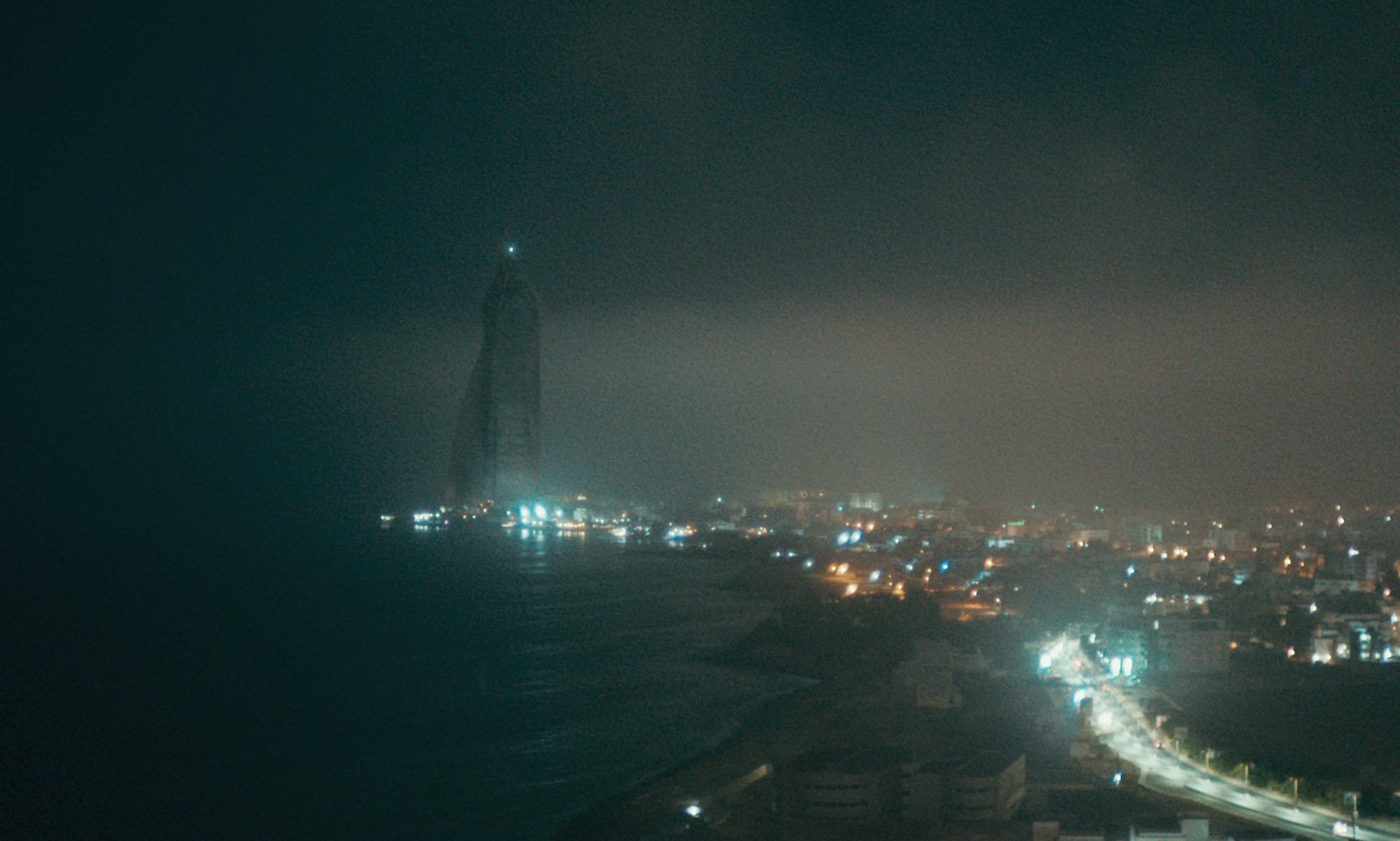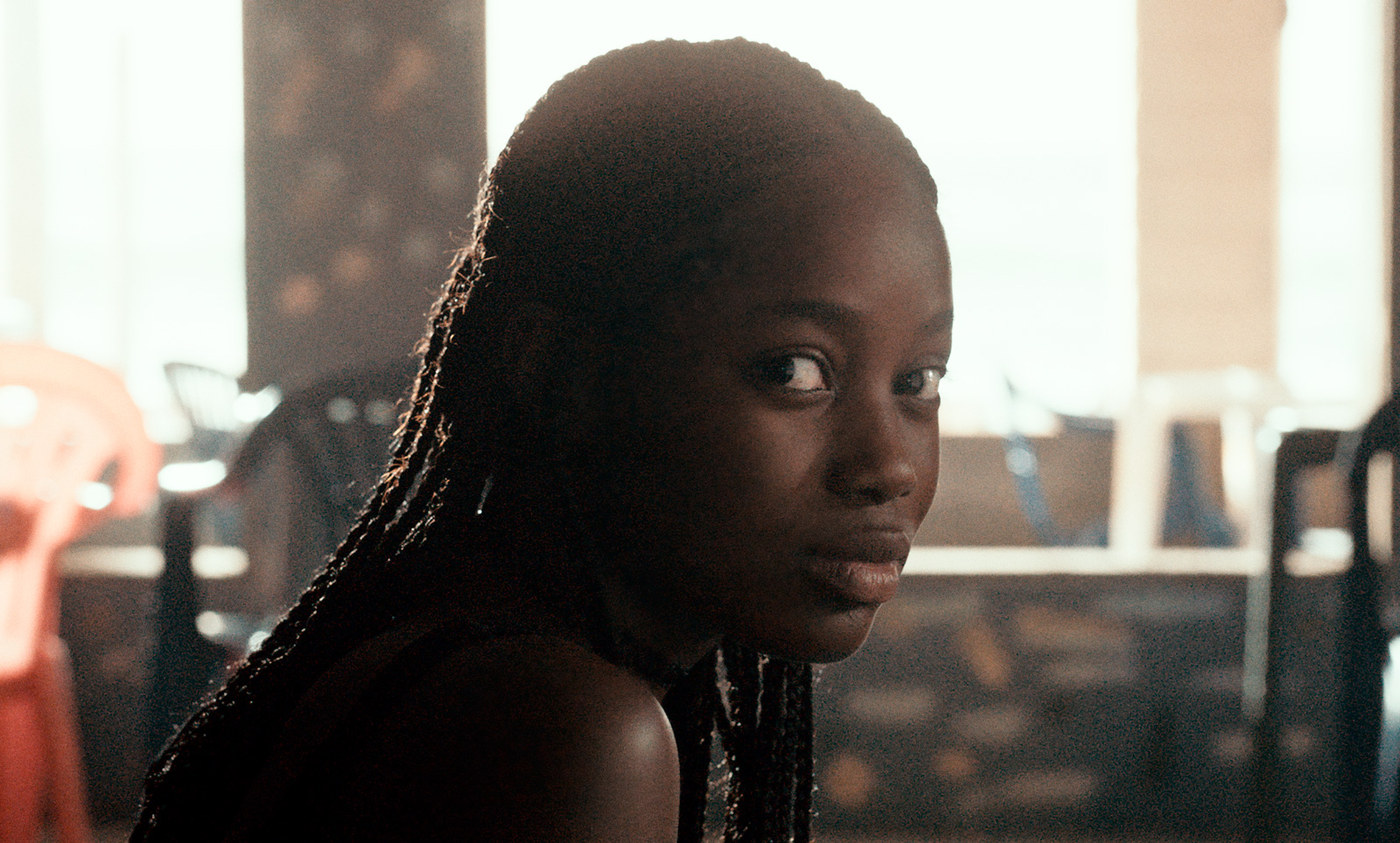Atlantics opens with the accusation of wage theft. On a sandy construction site just outside of Dakar, cows cross the land where a shiny tower will be built by the workers who are demanding their unpaid wages. “I don’t want a cozy chat,” one laborer says in Wolof to a foreman. “We’re here for our money.” The unrest, though dynamic, feels peripheral, as though we are supposed to be paying attention to something happening elsewhere. As though this first scene is a subplot. “Our fathers, mothers, and brothers depend on us,” another laborer says. “They’re the reason we work.” Crucially, they say nothing of their sisters and their lovers, though these will be the film’s central subjects.
Cut to the workers caravanning in the back of a truck, still without their pay. Cut to the half-built glass tower, getting smaller and smaller. Cut to the rough shore of the Atlantic Ocean. Cut to the workers singing and dancing and smiling and wailing. Finally we get some relief from the jump-cutting as the shaky camera zooms in on Souleiman, a young man with soft eyes and a steel jaw, and our connection to the film’s true protagonist, Ada, for Ada and Souleiman are young lovers. Atlantics is the intellectually serious first feature by the French actor and director Mati Diop, a film that spans genres—part romance, part horror, and part social commentary on the conditions that spur thousands of migrants to travel the perilous sea in hopes of reaching Europe.
But before we get a sense of this, early on in the film, Ada (played by Mame Bineta Sane) and Souleiman (Ibrahima Traoré) meet up to make out in an unoccupied unfinished building at the sea’s edge. Sneaking around and stolen kisses are well-worn teenage traditions, but in ten days’ time, “before God,” Ada will be marrying Omar (Babacar Sylla), a well-off businessman, a so-called good catch. Here’s the second instance of theft, this one a reversal. Ada, already engaged to Omar, steals away with Souleiman, stealing back some time. Someone discovers their tryst, and tells them to get out. “This isn’t a whorehouse!” Souleiman puffs up his chest, annoyed, but Ada laughs it off.
This is the last time Ada will see Souleiman. That night, the frustrated workers head off by boat to Europe, with the construction boss in their debt. Ada mourns her loss silently, still yearning to see Souleiman again someday. On her wedding night, an inexplicable fire burns through her pure-white matrimony bed. A policeman named Issa (Amadou Mbow) is called in to investigate, and he questions, follows, and even briefly arrests Ada. Many of the sisters and lovers left behind by the men at sea fall ill with a puzzling fever that turns out to be spiritual possession—the men have died at sea. Using the women’s bodies as hosts, they haunt the boss, breaking into his palatial home in the middle of the night to demand payment. But one of them, Souleiman, comes back, not for revenge, but for love—for Ada.
The bizarre elements of the film—spreading illness, whitened zombie-esque eyes, unexplained fire—are barely discernible as paranormal as the characters of Atlantics attribute the uncanny to spirits known in Arabic as djinn. How wonderful to be completely immersed, unquestioning, in a world where realism and fantasy commingle. Diop’s black fantastic is a burrow where her characters can go to worship, where the world is reoriented, where desire lives in excess, and vulnerabilities can be tended despite the thrashing experience of dispossession that we expect to see.
By defamiliarizing the familiar, Diop majestically avoids a sentimental approach to migration. Early in the film, the moon tickles the surface of the ocean’s hazy expanse. The blue-black of the ocean is speckled with Dakar’s city lights, red, blue, yellow. A group of girls, Ada among them, traipse along the sand on the way to a club with their heels dangling off their fingers and their sequined and leather accessories glinting. At the club, something’s off—another feeling that something is happening elsewhere, that we are again at the story’s periphery. Are the women, left behind, the center of the film, or at its edges? The feeling that the focus of the camera could at any moment shift helps us understand the precarity of the film’s subjects. Though the wage earners have departed, Diop’s Senegal is not desiccated, the women are pulsing with life—and sexuality—in part thanks to Atlantics’s phenomenal first-time actors.
When the young women learn that the “boys,” the construction workers of the opening scene, have put to sea, hoping to make it to Europe by small boat, the oceanside nightclub’s only guests sulk, bathed in a blue light that my friend, the writer Elleza Kelley, would call “Belly blue” after the director Hype Williams’s 1998 film. In this impactful scene, the film’s composition is awash in an ocean-deep navy that textures the black subjects amid the dark expanse of night and sea, a blue that is not only a color but a mood—the blues, what John Coltrane called “Afro blue,” signaling both woe and wildness. Pointillist specks of green flash about. Narrow beams of light bop to and fro. A phone’s glow lights up an anxious woman’s face. Someone offers another, hunched over the bar, a tissue. Carried by the intimate lighting, these impeccable shots come together to form a tableau vivant of the film’s most provocative element: its sluts.
Advertisement
“Hanging out with those sluts has changed you,” Ada’s childhood friend, the pious Mariama, tells her. “You know what he wants? To sleep with you and then he’ll dump you!” Since Ada is Diop’s lead, the film invites us to emphasize with her, to question whether she’s really the slut others say she is.
The question is one that was addressed directly by the aging woman protagonist of the 1992 film Hyenas (Hyènes), by the Senegalese director Djibril Diop Mambéty (and Diop’s uncle). “The world has turned me into a whore,” she said. “So I’ll turn the world into a whorehouse.” Hyenas, which Mambéty adapted from Swiss-German dramatist Friedrich Dürrenmatt’s 1965 play The Visit, is about a woman who, though once ostracized by her village as a pregnant teenager, gets as “rich as the World Bank” and seeks revenge on the village that rejected her.
While Diop’s Atlantics is more commonly discussed in connection with Mambéty’s first feature (also a romance), the exuberant Touki Bouki (1973), about two young Dakar lovers trying to emigrate to Paris, comparing Diop’s film to Hyenas opens up a more explicitly feminist perspective in Atlantics. Like Hyenas, Atlantics dramatizes a larger political economy by illuminating the circumstances of a woman condemned as a whore. “Do you know how many other women would love to be in your place?” Ada’s mom asks her rhetorically as she runs the chain Souleiman gave her over her lips. “Hold on to that place. Times are tough.”
Gender is a global concern, touching every shore, at every moment. At the start of the film, Ada is not exactly recalcitrant, though she’s on her way to mouthing off to her religious parents after they insist, at her fiancé’s family’s request, that she take a “virginity test.” From the start, she’s tainted by the sluts. She’s with the sluts. (The film’s narrative genius is to place Ada’s unruly, determined black feminism alongside the secondary female characters, physically overtaken by the men to demand justice.) And because the film encourages us to sympathize with Ada’s rebellion against the strictures of this society, the film’s perspective, too, is with the sluts.
Even as “slut” today has come to carry associations more financial than religious, the hypocrisy implicit in social opprobrium has changed little: sluts carry condoms, refusing to procreate and prioritizing pleasure; sluts don’t carry condoms, acting recklessly and selfishly draining resources. To be renamed from girl to whore, at seventeen, Ada’s age, is to be forced to reevaluate everything. Ada is coming into a radical understanding that her desires differ from those of her family and friends. She leans into the insults, the warnings, the precarity. Maybe she wants to be an uncooperative woman, maybe she wants to run away from her family, maybe she wants to disappear into Souleiman, maybe she wants to vanish entirely.
While the beginning of Atlantics is clear in its politics—give the workers their wages! globalized capitalism is death!—the resolution offers less certainty. Under the club’s blue light, Ada is finally reunited with Souleiman’s ghost, though the body he inhabits is the detective’s, the one who stalked and jailed her. It’s “just” his body, the spirit being Souleiman’s—and we see his reflection in the mirror, with Ada. At this point, Ada has nothing left to lose—perhaps only her virginity. And yet I can’t help but read this grim yet beautiful ending as a telltale sign that the world is a whorehouse, that love is abyssal, that the dead haunt us, and that the ones who leave and the ones left behind are intertwined in ways complex and unnerving.
In 2009, Diop made a sixteen-minute short, titled Atlantiques, that described the dream and risk of crossing the ocean from Senegal to Spain. “I can’t remember saying goodbye to you before leaving,” one character in that film said in Wolof. “Did I? What about you? Did we say goodbye? It’s hard to say goodbye to people you love. One cannot say: Goodbye, I’m leaving to die!” Atlantics, which premiered in France at Cannes this year and was in competition for the prestigious Palme d’Or (won by Parasite), tells us that the boys never said goodbye in life. Building on the preceding short, Atlantics is interested less in the rough journey to find a “better life” and more in the vitality of the living, the force of the women who stay. With the focus of a film about the capitalist undercurrent of migration finally and powerfully on Ada, in Africa, Diop’s imaginative feature exemplifies a labor politics fiercely concerned with gender and sexuality.
Advertisement
The end of the film is surprising in its buoyancy. Ada, alone, turns to watch herself in the mirror. She is looking herself in the eye, and, also, through the camera, at the viewer. “Last night will stay with me to remind me who I am and show me who I will become,” she says. “Ada, to whom the future belongs. I am Ada.” After depredation comes hopeful becoming and the destiny of marriage’s cage is deferred. For women whose fuck last night inspires a vision of the future, “who I will become” is also a kind of coming.
Atlantics is streaming on Netflix.





